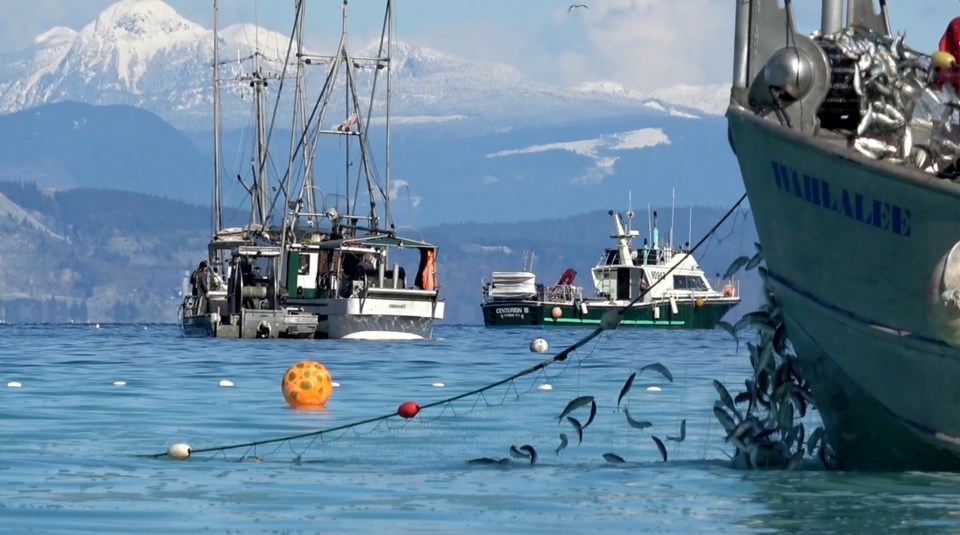Global fish stocks will not be able to recover to sustainable levels without strong actions to mitigate climate change, a new study involving UBC researchers says.
Scientists at the University of British Columbia, the Stanford Center for Ocean Solutions and University of Bern projected impacts that different global temperature increases and ranges of fishing activity would have on biomass, or the amount of fish by weight in a given area, from 1950 to 2100.
What they found suggested climate change has reduced fish stocks in 103 of 226 marine regions studied, including Canada, from their historical levels.
They said those stocks will struggle to rebuild their numbers under projected global warming levels in the 21st century.
“More conservation-oriented fisheries management is essential to rebuild over-exploited fish stocks under climate change. However, that alone is not enough,” said lead author William Cheung, a professor at UBC’s Institute for the Oceans and Fisheries (IOF).
“Climate mitigation is important for our fish stock rebuilding plans to be effective,” he said.
Fisheries and Oceans Canada spokesperson Kariane Charron said the department is working closely with Environment and Climate Change Canada and other partners to increase understanding of climate change impacts and advance a long-term climate strategy for Canada.
“The department continues to explore ways of better incorporating environmental factors, such as climate, oceanographic and ecological information, in its science advice on fish stocks and ecosystems, and in its decisions related to the management of fisheries, oceans and coastal infrastructure, species conservation, and marine safety,” Charron said.
Global warming
Currently, the world is on track to exceed 1.5 degrees of warming relative to pre-industrial levels and approach two degrees in the next few decades, Cheung said.
The study projected that, on average, when fisheries management focuses on the highest sustainable catch per year, the additional climate impacts on fish at 1.8 C warming would see fish stocks unable to rebuild themselves.
If people around the world fished only three-quarters of the annual highest sustainable catch, fish stocks would be unable to rebuild at a higher degree of warming, 4.5 C.
“Tropical ecoregions in Asia, the Pacific, South America and Africa are experiencing declining fish populations as species both move further north to cooler waters and are also unable to recover due to fishing demands,” said Cheung. “These regions are the ones that feel the effects of global warming first and our study shows that even a slight increase of 1.5 degrees Celsius could have a catastrophic effect on tropical nations that are dependent on fisheries for food and nutrition security, revenue and employment.”
In 2021, G20 nations recognized that limiting global warming to 1.5 C above pre-industrial levels would require “meaningful and effective” steps.
Worst-case scenario
A worst-case scenario, said the scientists, could see global fish stocks drop to 36 per cent of current levels. That scenario would result from a case where nothing is done to mitigate global warming, including meeting internationally agreed targets, and where overfishing beyond sustainable targets occurs.
“To rebuild fish stocks, climate change must be fully considered,” said study co-author Juliano Palacios-Abrantes, IOF postdoctoral fellow. “We live in a globalized world, where situations are interconnected. We are seeing this most significantly in tropical regions, but also in the Arctic, where many exploited species are slow to mature, or Ireland, Canada and the U.S., with high fishing mortality rates. These climate effects, even when we looked at conservation-focused scenarios, are making it too difficult for fish stocks to bounce back.”
Charron said oceans overall have become warmer, more acidic and less oxygenated due to climate change and human activity.
These changes have a direct impact on where marine animals live, what they eat and how they grow and develop, Charron said.
Due to climate change, the world is unlikely to return to historical levels of fish stocks, he added.
“We are at a turning point. What we need is a coordinated global effort to develop practical and equitable marine conservation measures to support effective biomass rebuilding under climate change,” he said.
“These need to recognize the ways that marine biodiversity contributes to livelihood and economies, particularly in tropical marine ecoregions, as well as requiring more stringent limits on fishing activities to achieve greater biomass rebuilding potential," Cheung said.



